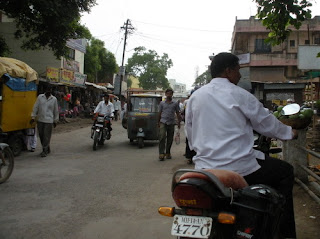After two months of interning at Chaitanya, I said goodbye to my co-workers and friends that I have made in the village. For my final project I wrote a report about the conflict resolving process that counselor's implement in their cases and how the goals of the Jankar program directly relate to the concept of "women's peacebuilding".
Here are a few excerpts from this report:
The mission of the Jankar program is directly related to the concept of “women’s peace-building”. As a whole, this organization is continuously working to break down systems of power. They work to provide access to resources for specific marginalized groups of people so that their lives’ may be improved. In women’s peacebuilding, “feminist analysis identifies women’s specific concerns about peacebuilding, approaches peacebuilding from women’s perspectives, welcomes pluralistic voices and diverse methods” (McKay & Mazurana, 2001, p. 3). By applying this concept to the Jankar program we can then ask critical questions about peacebuilding as it pertains to the women of rural villages. How do grassroots organizations empower their voices? What are differences and similarities between storytelling throughout various cultures? In what ways is peacebuilding seen across cultures? These are the types of questions that are important to remember when considering how an organization like Chaitanya is able to contribute to building systems of peace and equality for women in rural villages. With Chaitanya as a leader in developing and empower women’s leadership roles in their community and decision-making power this paved the way for some alleviation of rural women’s issues. However, there is still work to be done to help the lives of rural women and the need for women’s full participation and action is great. Chaitanya has focused on increasing the number of women that are involved in participation and decision-making. “These efforts are deemed critical to enhancing women’s peacebuilding initiatives and capacities for achieving a just peace” (McKay & Mazurana, 2001, p. 10). This type of impact gives a voice to women who have been oppressed or marginalized in their communities especially when it comes to their family life. Since domestic violence is often the reason why women come to the Jankar counseling center, increasing women’s participation will ensure that the issues are addressed appropriately.
...

As part of its mission, Legal Jankars inform their community about the services they provide for rural women. By reaching out to the community, at a personal level, the Jankars are able to meet with women who are interested in coming to the counsel center or becoming a Jankar themselves. This allows for growth, promotion, and continuity for the Jankar program and servicing women’s grievances. “Peacebuilding within women’s grassroots groups emphasizes relational behaviors, reconciliation and healing of psychological wounds” (McKay & Mazurana, 2001, p. 6). It also allows for groups to become tight-knit and form close relationships among one another. Having this type of focus strengthens the Jankar program at its core and helps to ensure power in numbers when a severe case arises. By having this collective outlook, women work together to solve the problems in their homes and villages.

...
The conflict resolving process for the Jankars is based on a model that is communal and personal. Within this framework the process of mediation involves many parties, such as elders and important community members. Value is placed on persons or groups who have been trusted in the community and are most often the mediators for interpersonal conflicts and dispute settlements.
Augsburger (1992) describes the following in regards to culture and the law:
Law as an abstract system of codified rules, collected cases, and established precedents may still be the dominant pattern of Western societies, but it is not, in human relational terms, the most effective or satisfactory pattern. In most societies a whole range of procedures and methods for resolving disputes and managing personal conflicts exists in addition to the use of court procedures
(p. 192).
The importance of community involvement in family and marriage matters for the rural areas of Maharashtra is emphasized in the Jankar program. Here there are community elders and leaders that help facilitate the counseling sessions and also educate and inform one another about issues that are most prevalent in the area. The Legal Jankar program means that there is a group of women who are active in knowing the laws and policies of the judicial system in India, but are not actually representing themselves as lawyers, but as skilled individuals that guide women who need assistance. This enables the mediator to actively have a voice for others and have the know-how of the law and what the rights of women are which is especially important in cases of domestic violence and abuse.
-----
My experience at Chaitanya allowed me to critical think about the ways in which gender issues affect women internationally. I was able to make similarities between America and India, as well as see big differences in the manner these things are handled, culture to culture. The biggest difference for me was the way counselors would mediate and facilitate the session. Mostly because there was more than 3 people involved. In the West we are used to one counselor and two parties. Here in India, it exceeded that number every time. This meant that there was often no structure in any way, at least for me, I did not see any. What I can take from this experience is knowing that the women of India are constantly fighting for their right to be heard, understood, and respected. This is a challenge and goal for women across the world.
As I move on from Chaitanya and into my next internship at Educate Girls, I expect that I will find similar goals but for the youth of India in education. I have already begun day two of this internship and will post shortly of my intentions and expectations as they relate to my background at university.


























